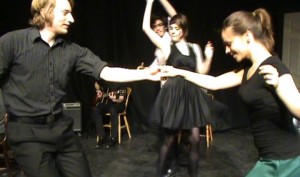
Review: Love, Jazz and the Devil
Love, Jazz and the Devil was a modernised Fathers and Sons for 1969’s Soviet Lithuania. When a system that once intended a greater humanity had long turned dark, and […]
Love, Jazz and the Devil was a modernised Fathers and Sons for 1969’s Soviet Lithuania.
When a system that once intended a greater humanity had long turned dark, and the generation who suffered Stalin and the war had been forced beyond their limits, and yet their humanity still tried, through the cracks, to come through, strained and filtered down to drops; when in the sixties and seventies their children tried to express themselves differently, and found themselves up against a wall that would not shift, and respect between fathers and sons was at its lowest; when doing what seemed right meant deviating from the path established by the long-suffering older generation and from the rigid code of the state’s systems was treated as madness, yet for those who knew their hearts, everything around them was in a state of madness… and even your friends, who sought solace in jazz music and a nascent hipness, were too loaded down by the toxicity of their situations (“Why is everything so awful?”), and tried to drink themselves free of it… this was the time of Love, Jazz and the Devil.
Here is an exploration of intergenerational conflicts and the efforts by each side to cope with what they see to be the failure of the other. Andrew (guitar), whose father is a police inspector, regards himself as above the law, boasting, abusing people and stealing with impunity. Matt’s father was an idealist who was interrogated and tortured, who clung to humanism yet was forced to publicly compromise and could not enact his ideals even within his own family. Matt himself (alto sax) takes a philosophical approach to things, though we discover that he is a philanderer who cannot take responsibility for his actions. Luke (piano and drums) is an orphan, mercilessly ridiculed by the other two and used as their scapegoat and bottle-fetcher.
The three young men shut themselves up together to drink and play their music, studiously avoiding the ever-present knocks on the door; and here they encounter Beatrice, who represents, to each in his own way, their ideal, and each in turn tries to win her. She alone, also from a broken background, stays true to her vision of love – not just of one person, but of love as the way of life itself, love penetrating all things and guiding their paths. She survives humiliation at the hands of her school head and a spell in a mental asylum and emerges asking questions of all sides. For the boys, grappling with their identities, their lack of a reliable frame of reference, and their youthful lust, and each struck by Beatrice’s angelic qualities, she is too much. Each needs her to save them from themselves. An outcome is inevitable, and it is entirely in keeping with what has gone before – but on its cusp the hopes and dreams of Beatrice and of a whole human entity break out, volatile, precious, graspable for a moment.
 Vividly translated from Lithuanian by the director and with some feisty and energetic acting, with a ‘devil’ reminiscent of The Master and Margarita, this is a first for a significant Lithuanian work in the UK. While strongly rooted in a time and place, this work is equally a compassionate study of universal human weaknesses and human aspirations for truth. It has the potential to go on to a wider audience than its first at the University of St Andrews. It deserves wider exposure.
Vividly translated from Lithuanian by the director and with some feisty and energetic acting, with a ‘devil’ reminiscent of The Master and Margarita, this is a first for a significant Lithuanian work in the UK. While strongly rooted in a time and place, this work is equally a compassionate study of universal human weaknesses and human aspirations for truth. It has the potential to go on to a wider audience than its first at the University of St Andrews. It deserves wider exposure.
Written by Robin Thomson, standing-room-only writer









































